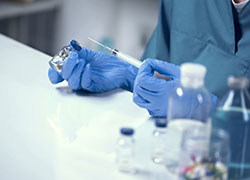The Commonwealth Government’s Medical Research Future Fund (MRFF) has invested almost $3 million into new COVID-19 vaccine candidates led out of Melbourne.
The two vaccine candidates were developed by a team of researchers from the Peter Doherty Institute for Infection and Immunity (Doherty Institute), and the Monash Institute of Pharmaceutical Sciences (MIPS), and are providing encouraging results in preclinical testing. This project is also supported by vaccine manufacturer, Seqirus (a CSL company).
University of Melbourne Professor Dale Godfrey, Immunology Theme Leader at the Doherty Institute, said the vaccine approaches were very different to the two Australia-based candidates currently in clinical trials.
“SARS-CoV-2, the virus that causes COVID-19, is enveloped by proteins that resemble spikes, which enable the virus to attach and enter cells. This attachment is mediated by the tip of the spike protein, known as the receptor binding domain (RBD). Our vaccine candidates focus specifically on the RBD because if we can block this attachment we can block infection,” Professor Godfrey said.
“The spike protein is viewed as the most important target for antibodies produced by the immune system because most antibodies that neutralise the virus do so by targetting the RBD region of the spike.”
The two candidates:
Monash University Professor of Pharmaceutical Biology, Professor Colin Pouton said: “Our approach includes messenger RNA technology which should provide a very safe and focussed vaccine with the important ability to rapidly adjust its composition in response to emerging virus mutations – if the virus mutates, a new vaccine can be tested within a few weeks.”
Professor Sharon Lewin, Director of the Doherty Institute and a co-investigator on this grant, thanked the Commonwealth Government for their generous support of the vaccine candidates.
“We are very excited about this vaccine approach, which now, thanks to the support of the Commonwealth, will be expedited, hopefully entering Phase 1 human trials quickly,” Professor Lewin said.
More updates and news from the Doherty Institute
